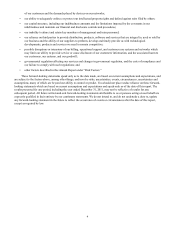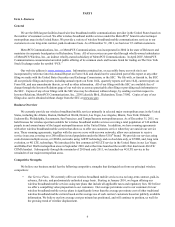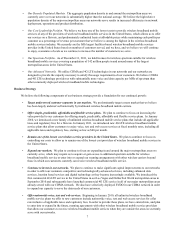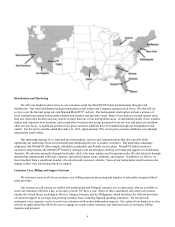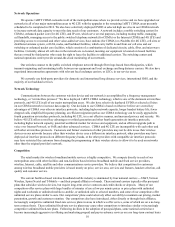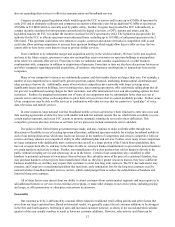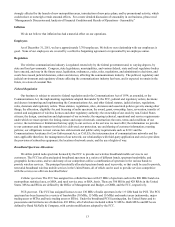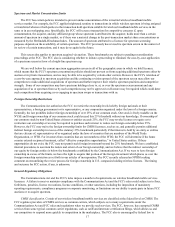Metro PCS 2011 Annual Report Download - page 22
Download and view the complete annual report
Please find page 22 of the 2011 Metro PCS annual report below. You can navigate through the pages in the report by either clicking on the pages listed below, or by using the keyword search tool below to find specific information within the annual report.11
and, in some cases, have relaxed their requirements for long term contracts or credit checks. In addition, other facilities-based
regional wireless broadband mobile carriers, such as Cricket Communications, an affiliate of Leap Wireless International, or
Leap, have unlimited fixed-rate service plans similar to ours and compete with us in certain of our metropolitan areas on a
facilities based and non-facilities based basis.
In addition to facilities-based wireless broadband mobile carriers, the wireless broadband mobile industry also includes
carriers such as Tracfone and PagePlus that are solely non-facility based mobile virtual network operators, or MVNOs, and
some, such as Cricket Communications, which is a combination of facilities based and non-facilities based carrier, that contract
with wireless network operators to provide a separately branded wireless service. In some cases these MVNOs have business
arrangements with one of the other major nationwide carriers, which may give them access to a more extensive network than
ours and we believe at lower prices than we pay for roaming for access to service out of our service areas. These MVNOs offer
increasingly competitive service plans similar to the service plans we provide in addition to offering more traditional prepaid
plans that charge by the minute.
The wireless broadband industry also includes other new entrant facilities-based providers, such as Clearwire and
LightSquared. Clearwire has announced that it is building a network utilizing WiMax, which is the name given to a family of
digital technologies that are capable of supporting high-speed, long-range wireless services suitable for mobility applications,
using spectrum predominately in the 2.5 GHz range to construct a national network to provide wireless data and
telecommunications services. Clearwire owners currently include Google, Intel, Sprint, Comcast, and Time Warner Cable.
LightSquared holds satellite spectrum covering North America which also permits it to build ancillary terrestrial facilities to
supplement its satellite based services. LightSquared has announced that it plans to build a new nationwide 4G LTE wireless
broadband network integrated with satellite coverage in the United States and will provide wireless broadband capacity to a
diverse group of customers, including retailers, wireline and wireless communication service providers, cable operators, device
manufacturers, web players, content providers, and many others. The LightSquared network will allow these customers to offer
satellite-only, terrestrial-only, or integrated satellite-terrestrial services to their end users. Dish Network, or DISH, in 2011
announced a transaction to acquire 40 MHz of mobile satellite services spectrum. This spectrum allows the licensee to provide
terrestrial services as an ancillary service to the satellite service subject to certain FCC requirements. In connection with its
application to the FCC for transfer of the leases, DISH has requested waivers from certain of these requirements, which would
allow DISH to be able to fully compete with terrestrial wireless broadband mobile services.
The wireline voice and broadband industry is dominated by large incumbent carriers, such as AT&T and Verizon. In
addition, large cable companies, competitive local exchange carriers and VoIP service providers also provide competition for
wireline voice and broadband services. The cable industry is dominated by large carriers such as Time Warner Cable, Comcast
and Cox Communications. These cable companies, along with cable company Advance/Newhouse (now Bright House
Networks), formed a joint venture called SpectrumCo LLC, or SpectrumCo, which bid on and acquired 20 MHz of advanced
wireless services, or AWS, spectrum in a number of major metropolitan areas throughout the United States, including all of the
major metropolitan areas in which we have built. SpectrumCo LLC and Cox recently announced a transaction to sell 20 MHz
of AWS spectrum to Verizon Wireless and to enter into agreements under which Verizon Wireless and the owners of
SpectrumCo would resell each other's services.
In the future, we may face increased competition from other mobile satellite service, or MSS, providers, and from
resellers of these services. The FCC has granted some MSS providers, including LightSquared, the flexibility to deploy an
ancillary terrestrial component, or ATC, to their satellite services. This added flexibility, which has been granted to some and
may be granted to other, MSS operators, may enhance their ability to offer more competitive mobile services. Recent press
reports suggest that the FCC may limit LightSquared's ability to offer its planned services. As a result, while their future plans
are uncertain, these MSS operators, including LightSquared, may compete with services we sell or plan to sell or may sell or
lease their spectrum to others, including new entrants, who may compete with us. In addition, several large satellite companies,
computer companies, and Internet search and portal companies have indicated an interest in establishing next generation
wireless networks, and certain VoIP providers have indicated that in the future they may acquire FCC licenses or use unlicensed
spectrum to offer wireless services to compete directly with us. For example, Google has announced plans to offer broadband
wireless data services using fiber in Kansas City, Kansas and Missouri. Google has publicly announced that the goal is to
provide data at a speed of 1 gigabit per second, which is considerably faster than our wireless broadband mobile services. The
FCC also has adopted an order that allows companies to provide wireless services on an unlicensed basis in certain unused
portions of the television spectrum. Further, we also may face competition from new entrants and others using exclusively
licensed or unlicensed spectrum. Additionally, we may compete in the future with companies that offer new technologies and
market other services we do not offer or may not be available with our network technology, from our vendors or within our
spectrum. Some of our competitors bundle, or may bundle, these other services together with their wireless communications
service, which customers may find more attractive. For example, the owners of SpectrumCo, Cox and Verizon have entered
agreements with Verizon that would allow each to sell the services of the other. Some energy companies and utility companies




